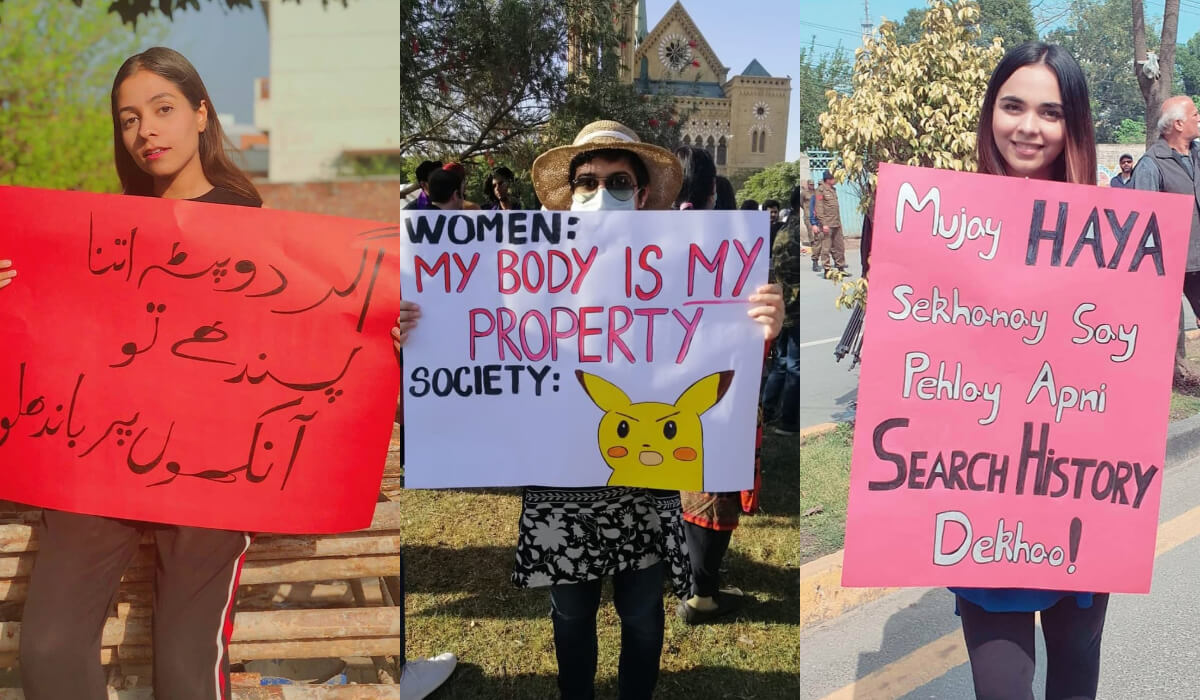To mark International Women’s Day and call for the protection of women’s rights, organizers came together to hold Aurat Marches across the country.
Looking back, the first Aurat March was held in 2018 in Karachi which later on extended to more cities, including Lahore, Multan, Faisalabad, Larkana, and Hyderabad. This year, the marches will be held in Karachi, Lahore, Islamabad, and other cities of Pakistan with their own manifestos.
In Karachi, the march is scheduled to take place at Frere Hall, focusing on patriarchal violence. In view of the current coronavirus situation, organizers have emphasized standard operating procedures (SOPs), including wearing masks and maintaining a distance of six feet.
The Karachi march will also be broadcast live.
We understand not everyone can come to the march for various reasons but specifically because of Covid-19 related precautions.
— Aurat March – عورت مارچ (@AuratMarchKHI) March 7, 2021
So we have arranged for 𝐄𝐥𝐞𝐜𝐭𝐫𝐨𝐧𝐢𝐜 𝐃𝐢𝐚𝐫𝐲 to broadcast 𝐀𝐮𝐫𝐚𝐭 𝐌𝐚𝐫𝐜𝐡 Dharna 𝙇𝙄𝙑𝙀 From Frere Hall, Karachi#AuratMarch2021 pic.twitter.com/PAduslCGLy
In Lahore, the Aurat March will be held in the afternoon from the Lahore Press Club to the PIA Building. It will address healthcare workers and women’s health whereas the Islamabad march is dedicated to the crisis of care.
ROUTE FOR #AURATMARCHLAHORE 2021:
— عورت مارچ لاہور – Aurat March Lahore (@AuratMarch) March 5, 2021
The route is from Lahore Press Club to the front of PIA building! There is also a designated entry point for differently abled and old people. It is the road between Governor House and Al Hamrah.
SOPs to be followed.
MONDAY, 8th MARCH AT 2 P.M. pic.twitter.com/j424kmJ6F3
We will be marching this year, like we have been for the past 4 years.#AuratAzadiMarch2021#AuratAzadSamajAzad pic.twitter.com/pbETI1XVxd
— Aurat Azadi March Islamabad (@AuratAzadiMarch) March 8, 2021
The Karachi chapter’s demands include an “end to gender-based violence by patriarchal forces as well as state-backed violence targeting activists, religious groups and communities and effective and transparent investigation of gender-based crimes and fair and expeditious trials”.
Other demands include criminalization of virginity tests for rape victims, the establishment of gender-based violence reporting cells in police stations across Sindh and Pakistan, and an end to sexual harassment.
Saada haqq
— Aurat March – عورت مارچ (@AuratMarchKHI) March 7, 2021
Aithay rakh!
Here is our 15 point agenda for this year! It is a condensed version of our complete charter of demands & focuses broadly on the theme of gender-based violence inflicted upon women, transgender & non-binary persons.#AuratMarch2021#PatriarchyKaPandemic pic.twitter.com/TApDaKfmz5
In line with its focus on healthcare workers and women’s health, the Lahore chapter’s demands include fulfillment of basic necessities by the state and a better infrastructure given to survivors of abuse who need access to mental as well as physical care within a rehabilitative framework in order to adequately manage the long-term effects of the violence visited upon them.
Concerns about other health issues are also raised in the document, including, educational programs and training aiming to stop stigmatization and shame associated with gendered bodies, breast cancer, reproductive health, the gender pay gap, more gender sensitized medico-legal practitioners, charging for forensic services (including from rape victims), HIV, access to free medicines, rights of PWDs, implementation of the Transgender Act 2018, access to clean water and toilets, especially to avoid contraction of Covid-19, healthcare for female prisoners, and drug addicts and users, an end to the underage marriages, and several other issues associated with the health sector.
Meanwhile, various ministers and politicians recalled the role of women in their lives while simultaneously calling for them to be given equal rights.
Army chief Gen Qamar Javed Bajwa in his message said, “Pakistani women had contributed immensely for the glory and honor of our nation”. Talking about women in uniform, Gen Bajwa said they have “proved their mettle by contributing copiously in diverse fields serving the nation & humanity”.
“Pakistani women contributed immensely 4 glory & honour of our nation. They are also @ forefront against COVID. Women in uniform have proved their mettle by contributing copiously in diverse fields serving the nation & humanity. They deserve our immense respect & gratitude” COAS
— DG ISPR (@OfficialDGISPR) March 8, 2021
National Assembly Speaker Asad Qaiser said that the protection of women’s rights was the “top priority” of the government because it was “imperative for the formation of a progressive society”, according to a report by Radio Pakistan.
Minister for Information Shibli Faraz said March 8 “highlighted women’s high status in society and their commendable services in different sectors”.
“Making women powerful and protected in society by ensuring equal rights and equal opportunities for progress for them is our determination,” he stressed.
معاشرے کو مہذب اور روشن خیال بنانے کےلئےخواتین کو بااختیار بنانا لازم ہے۔خواتین کو ترقی کے مساوی مواقع اور حقوق کی یقینی فراہمی سے معاشرے میں طاقتور اور محفوظ بنانا ہمارا پختہ عزم ہے۔ انفورسمنٹ آف ویمن پراپرٹی رائٹس خواتین کے وراثتی حقوق کو یقینی بنانے میں ممد و معاون ثابت ہوگا۔
— Senator Shibli Faraz (@shiblifaraz) March 8, 2021
PML-N Vice President Maryam Nawaz also talked about women empowerment, saying she “dream[s] of a Pakistan where women excel in every field and play leading roles”.
A society without empowered women becomes dysfunctional. I dream of a Pakistan where women excel in every field and play leading roles. #InternationalWomensDay
— Maryam Nawaz Sharif (@MaryamNSharif) March 8, 2021
Federal Education Minister Shafqat Mahmood paid tribute to all the women in his life, including his mother, wife, daughters, sisters, and his colleagues at work and in politics.
“Thank you for making the world a better place,” he wrote.
On this women’s day I first pay homage to my late mother whose caring and prayers made everything possible and then to all the women who enrich my life; my wife, my daughters, my sisters, my colleagues at work and in politics/media. Thank you for making the world a better place
— Shafqat Mahmood (@Shafqat_Mahmood) March 8, 2021
Minister for Science and Technology Fawad Chaudhry encouraged girls to opt for science subjects to change their and the country’s destiny.
On this #womensday2021 I want to urge all the girls there go for Science subjects change your destiny and change this Nations destiny, stay blessed …. more power to you
— Ch Fawad Hussain (@fawadchaudhry) March 8, 2021
Muttahida Qaumi Movement-Pakistan (MQM-P) leader and newly-elected senator Faisal Subzwari reminded people that respecting women also meant “respecting their liberty of making choices”.
Respect means respecting their liberty of making choices.
— Faisal Subzwari (@faisalsubzwari) March 8, 2021
Let's encourage women of our families.
We as a society badly need educated, confident & courageous women.
AND
NO means NO #InternationalWomensDay










